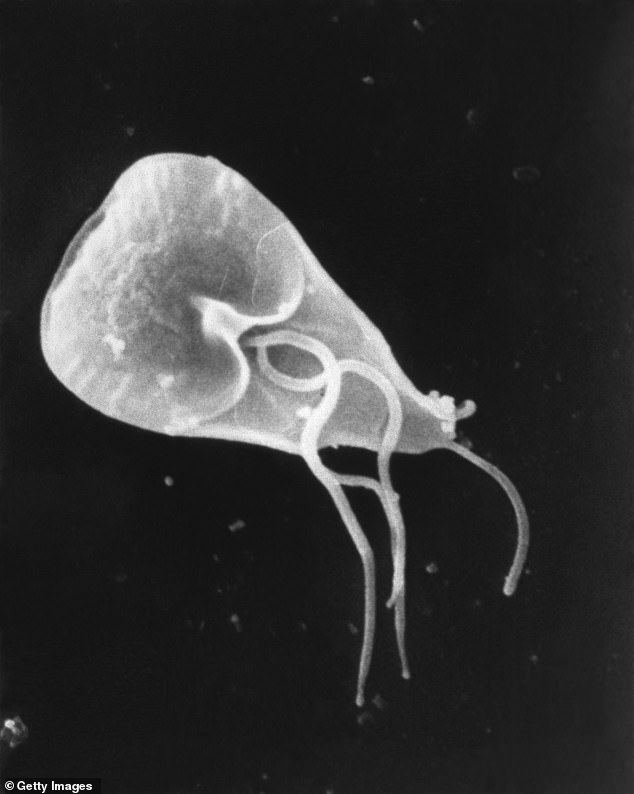A UK Health Security Agency spokesperson said they were aware of the deaths of two children who attend Millstead Primary School in Liverpool which is battling an outbreak of a stomach bug.
Two children attending a special needs school in Liverpool battling an outbreak of giardiasis,a disease caused by a parasite,have died.
The names of the deceased,as well as their exact cause of death,have not been revealed.
However,health officials have said the deaths are 'unlikely to be due to Giardia' despite the ongoing outbreak.
A UK Health Security Agency spokesperson said: 'UK Health Security Agency are aware of the sad deaths of two children who attend Millstead Primary School and our thoughts are with the family,friends and school community.
'The deaths are unlikely to be due to Giardia. Giardia usually causes a self-limiting gastrointestinal illness which can spread easily in households and school settings.'
Emma Savage,Consultant in Health Protection for our Cheshire and Merseyside Health Protection Team,added 'Investigations are ongoing,and we have provided information and advice to the school and parents. Public health measures have been put in place to help prevent further cases.'
Here MailOnline explains the signs of the infection,how long it lasts,what to do if you or your child are infected and how to best avoid it in the first place.

Michelle Beard,the headteacher at Millstead Primary School,said the community was 'devastated' by the deaths of the children
What are the main ways people can be infected with giardia lamblia?
Giardia lamblia is spread through contact with infected faeces of people and animals hosting the parasite.
This commonly occurs through contaminated food or water supplies.
Such contamination can occur through drinking or swimming in water supplies tainted by human or animal sewage.
London-based consultant gastroenterologist,Dr Aathavan Loganayagam,said: 'Once inside their host,the microscopic cysts rapidly multiply. An infected person can shed millions of cysts a day in their faeces.'
Infection can also occur from food contamination,for example though vegetables being washed with tainted water or by person with giardiasis preparing meals.
The parasite can also be spread by direct contact with an infected person,such as a parent caring for a sick child.
Dr Loganayagam also said people can get infected through indirect contact,for example by 'touching contaminated surfaces such as bathroom taps or door handles'.
While some Brits get the disease while overseas,and only fall ill upon returning to the UK,domestic cases and onward transmission does occur.
Lastly,giardia lamblia can also be transmitted by sexually contact,especially unprotected anal and oral sex.
How is it diagnosed and treated?
GPs who suspect a patient has giardiasis will have patients submit a stool sample which is then sent to a specialised lab to test from traces of giardia lamblia.
If infection is confirmed patients are usually prescribed antibiotics to help their body fight off the infection.
Patients are also told to ensure they are getting enough fluids as the diarrhoea it causes can lead to dehydration.
Sometimes medics also advise people living with a confirmed giardiasis patient to also be tested and take medication even if they aren't experiencing symptoms.
Can it be fatal or cause complications?
Yes,thought this is very rare in countries like the UK.
An estimated 200million cases of giardiasis are estimated to occur globally each year,of which only a fraction 500,000 are thought to be fatal.
Giardiasis is considered to be more broadly more dangerous for children and people with weakened immune systems,as is standard with most illnesses.
Some people infected with giardiasis experience long-term symptoms which include arthritis,irritable bowel syndrome,recurring diarrhoea,weight loss and problems absorbing nutrients like fat or vitamin B12.
In children specifically a serious giardiasis infection can delay physical or mental development and even lead to malnutrition as they struggle to absorb nutrients in their food.
What should I do if I think I'm infected?
Brits are also asked to contact their GP or NHS 111 if they or their children have and symptoms of giardiasis.
Patients in the UK are also advised to call NHS 111 if they have had diarrhoea for over a week or have any episode of bloody diarrhoea.
People with giardiasis are also asked to wash their hands frequently with soap and water,was their clothing and bedding separately from other people and clean surfaces like toilets and door handles regularly to reduce the risk of spreading the infection to others.
They are asked to not prepare food for other people if possible,not share towels or utensils,and not go swimming for at least two weeks after their last symptom for the same reason.

© Singapore Technology Information Privacy Policy Contact us